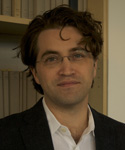On Totalitarianism and Complicity: Q&A with Philosophy Prof Adam Knowles, PhD
August 13, 2019
A new book by Assistant Teaching Professor of Philosophy Adam Knowles, PhD, reexamines the philosophical and political affinities of Martin Heidegger, one of the most famous intellectuals to embrace fascism in Nazi Germany. Knowles gives us the backstory on “Heidegger’s Fascist Affinities: A Politics of Silence,” published by Stanford University Press, and shares what’s next for his research as he embarks on a fellowship to Germany.

Your book, “Heidegger’s Fascist Affinities,” takes the reader to a university in Nazi Germany. Tell us about the inspiration behind that.
What motivates me is trying to understand how the humanities respond to authoritarian regimes. We often think that the humanities would be a site of resistance against totalitarianism, but that’s simply not the case, especially in the case of Nazi Germany. Many professors on the forefront of supporting the regime tended to come from the humanities.
Why do you think that was?
Those professors were themselves anti-Semitic, hyper-conservative nationalists who felt that they could contribute to the regime in some way. Totalitarian movements are not always top down; instead, they also find a way to entice people to contribute. In particular, they want legitimacy from traditional forms of authority, like academics and the church.
These regimes often have an all-encompassing worldview, so they need a philosophical justification. They need a history — a mythology to draw upon — and they need a nationalist literature. At the initial stage of establishing legitimacy, the humanities can offer something that the natural sciences can’t usually do. Later, when it comes to weapon production, the natural sciences obviously become much more important.
 Adam Knowles, PhD
Adam Knowles, PhD
What drew you to focus specifically on Martin Heidegger in your book?
He is one of the cornerstone figures of 20th century philosophy and intellectual history. Many post-1945 philosophical movements would be unthinkable without his contributions. I was always sort of troubled and fascinated by the fact that we always clearly knew he was complicit in the Nazi regime. Nonetheless, the discipline of philosophy has invested an intense amount of energy in rehabilitating him — even from his own Jewish students in the 1940s and 50s. It all hinged upon this commitment to his greatness. I found that very revealing about the discipline of philosophy itself. I agree that he made immense philosophical contributions, but that doesn’t mean we should overlook his complicity.
Tell us more about Heidegger’s complicity in the Nazi regime.
Heidegger joined the Nazi party in 1933 and became Rector (our equivalent to President) of the University of Freiburg. His role was to Nazify or “Ayranize” the University. By April of 1933, the party mandated that all Jewish professors were to be removed from universities. But university rectors had discretion as to whether to expedite or slow the process. Heidegger demonstrated the administrative talent and will to implement it as quickly as possible.
He was ruthlessly efficient at radicalizing the letter of the law to the maximum extent possible. Within two weeks, all Jewish professors had been removed from Freiburg. Within a few years, there were quotas for Jewish students, mandatory race-science lectures and alliances with Nazi student organizations. Heidegger provided the example to the Federal Ministry of Culture, which oversaw the university system, of how Ayranization should happen.
What was the impact of his support within the Nazi party?
By 1927, Heidegger had published his famous work “Being and Time”and had become a world-renowned intellectual figure. Securing his alliance with the party was an important gesture. To have someone of his international stature align himself with the party was incredibly meaningful.
What can you tell us about complicity more generally?
Forms of complicity in totalitarian regimes are quite broad. It doesn’t always mean joining a party or, in the case of the Nazis, wearing a swastika. The initial point of complicity begins with renouncing things you previously did, or losing the courage to say things you previously would have said.
Often, the logic of radicalization in totalitarian regimes happens in securing your initial complicity in some way, and then intensifying it. In Nazi Germany, when Jews were deported, the contents of their homes were auctioned. So suddenly, during a time of shortage and rationing, you owned some luxury item that you previously couldn’t afford, that’s been sold to you at a discount price. You may have approved or disapproved of the deportation of Jews, but now you’ve profited from it.
What was your research process for the book like?
I spent a lot of time in the Freiburg university archives with a fellowship from the Holocaust Educational Foundation of Northwestern University, looking at how Heidegger implemented the Nazification policies. What did he do on a day-to-day basis to radicalize the University? I’m not the first to look at these publications, but there’s been a lack of attention to them in English-language publications.
Why would you encourage Drexel students to develop archival skills?
The archives allow you to not just accept someone’s interpretation, but return back to the original material and ask yourself where it comes from — what is there, what are the sources of silencing and absences in the archives, what voices were suppressed — essentially, tracing the intellectual history. Having these research skills is essential.
You have an upcoming, yearlong fellowship to Germany from the Andrew Mellon Foundation and the Volkswagen Foundation. What will you be working on?
The fellowship will support my second book “Categories of Complicity: Philosophy Under National Socialism.” My first book was about Heidegger’s philosophical works, and the second will be about the discipline as a whole. How did philosophers contribute to National Socialism? I will be researching the book’s case studies in the German Literature Archive in Marbach am Neckar, Germany; I’ll also be in the German Federal Archives in Berlin, looking at the academic surveillance of philosophy professors.
I’m also translating two books by Heidegger. One of the works is part of the “Black Notebooks,” portions of his private diaries that were first published in 2013. I’m translating the fourth volume, which he wrote in the years from 1942-48, a period which included his denazification. He had to openly denounce affiliation to the Nazi administration, but he is deeply anti-Semitic in his diaries. They caused something of a scandal when they first came out.
Finally, how did you become a philosopher?
I studied at the University of Texas at Austin, initially as a mechanical engineering student. I disliked my engineering courses and ended up in Intro to Western Philosophy. Philosophy is not something that you become exposed to at a young age. It opens up a world of ways to think about things — different modes of truth, asking questions that you didn’t know could be asked. I knew I wanted to teach because of having good teachers.
At Drexel, I’ve taught a lot of business and engineering students. They learn to make strong arguments that are not verifiable in a mathematical manner. The paradox of learning philosophy is that sometimes you know less at the end.
“Heidegger’s Fascist Affinities: A Politics of Silence” is available online at Stanford University Press.